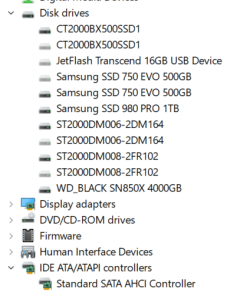frenzy
Member
- Local time
- 4:58 PM
- Posts
- 64
- OS
- Windows 11
- About 8 years ago when I built this computer I was using Intel
- 3 years ago I switched to AMD
- I currently have the following drivers installed:
iastora iaStorA c:\windows\system32\drivers\iastora.sys
iastoravc Intel Chipset SATA RAID Controller c:\windows\system32\drivers\iastoravc.sys
iastorf iaStorF c:\windows\system32\drivers\iastorf.sys
iastorv Intel RAID Controller Windows 7 c:\windows\system32\drivers\iastorv.sys
Should I remove them? How can I safely do so?
"iastorf.sys" in particular pops up with a bluescreen error when I attempt to run my system in Secure Boot Windows UEFI mode
- 3 years ago I switched to AMD
- I currently have the following drivers installed:
iastora iaStorA c:\windows\system32\drivers\iastora.sys
iastoravc Intel Chipset SATA RAID Controller c:\windows\system32\drivers\iastoravc.sys
iastorf iaStorF c:\windows\system32\drivers\iastorf.sys
iastorv Intel RAID Controller Windows 7 c:\windows\system32\drivers\iastorv.sys
Should I remove them? How can I safely do so?
"iastorf.sys" in particular pops up with a bluescreen error when I attempt to run my system in Secure Boot Windows UEFI mode
- Windows Build/Version
- 22631.3880
My Computer
System One
-
- OS
- Windows 11
- Computer type
- PC/Desktop
- Manufacturer/Model
- Custom Build
- CPU
- AMD Ryzen 5600x
- Motherboard
- B550-F Gaming








